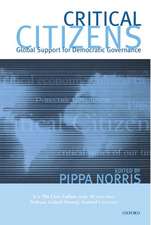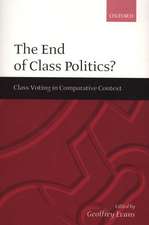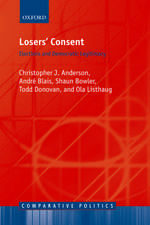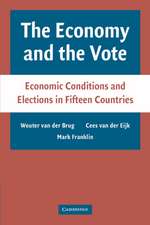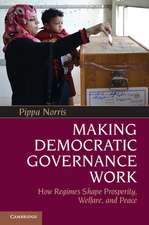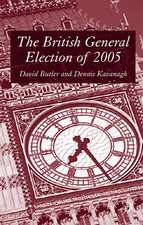Comparing Democracies: Elections and Voting in a Changing World
Autor Lawrence LeDuc, Richard G. Niemi, Pippa Norrisen Limba Engleză Paperback – 7 apr 2014
Edited by three leading figures in the field, the new edition brings together an impressive range of contributors and draws on a range of cases and examples from across the world. It now includes:
- New chapters on authoritarian elections and regime change, and electoral integrity
- A chapter dedicated to voting behaviour
- Increased emphasis on issues relating to the economy.
| Toate formatele și edițiile | Preț | Express |
|---|---|---|
| Paperback (1) | 481.03 lei 6-8 săpt. | |
| SAGE Publications – 7 apr 2014 | 481.03 lei 6-8 săpt. | |
| Hardback (1) | 1071.78 lei 6-8 săpt. | |
| SAGE Publications – 6 apr 2014 | 1071.78 lei 6-8 săpt. |
Preț: 481.03 lei
Nou
Puncte Express: 722
Preț estimativ în valută:
92.07€ • 100.05$ • 77.39£
92.07€ • 100.05$ • 77.39£
Carte tipărită la comandă
Livrare economică 21 aprilie-05 mai
Preluare comenzi: 021 569.72.76
Specificații
ISBN-13: 9781446281987
ISBN-10: 1446281981
Pagini: 256
Dimensiuni: 170 x 242 x 13 mm
Greutate: 0.43 kg
Ediția:Fourth Edition
Editura: SAGE Publications
Colecția Sage Publications Ltd
Locul publicării:London, United Kingdom
ISBN-10: 1446281981
Pagini: 256
Dimensiuni: 170 x 242 x 13 mm
Greutate: 0.43 kg
Ediția:Fourth Edition
Editura: SAGE Publications
Colecția Sage Publications Ltd
Locul publicării:London, United Kingdom
Recenzii
Compared to its predecessors, the fourth edition of Comparing Democracies is entirely different and yet it is much the same. It is much the same because it offers again a superb collection of chapters dealing with democratic institutions and processes in a changing and multifaceted political world. And it is entirely different because the focus of the collections has been altered to include measurement issues of democracy; a growing emphasis of the profession on the context of the vote, and on the manner in which elections are conducted. As a consequence of that, all chapters but one are entirely new or substantially revised. The group of contributors, while largely different from previous editions, is again outstanding. It introduces some of the most important new work on those issues to the broader community of scholars interested in elections and democracy. For all these reasons, Comparing Democracies will remain a must-read for students and lecturers of elections and voting behaviour, comparative politics, parties, and democracy.
The 4th edition of Comparing Democracies continues the editors’ tradition of bringing together leading scholars to address the fundamentals of democratic politics and major advances in scholarship. In this edition, they expand their view to include recent advances in thinking about how even apparently futile competition in electoral-like settings shapes outcomes in authoritarian regimes. This and other new additions mean that this work now touches on every nation in a truly comparative way without losing sight of democratic fundamentals.
Indeed, more so than any of the earlier editions, the present volume is characterised by a considerable use of statistical models. Another valuable aspect of the book is that it provides a list of all the electoral systems used around the world, which includes disproportionality scores, the effective number of parties and the percentage of female MPs...For the comparative political scientist this edition is an improvement upon earlier editions. It is a safe prediction that the individual chapters will be cited extensively in years to come.
Comparing Democracies, Fourth Edition, brings together eleven prominent scholars who cover a wide range of highly relevant topics in the field of electoral research and provides a great resource for young scholars and students to build a theoretical and comparative understanding in the wide range agenda of political science.
The 4th edition of Comparing Democracies continues the editors’ tradition of bringing together leading scholars to address the fundamentals of democratic politics and major advances in scholarship. In this edition, they expand their view to include recent advances in thinking about how even apparently futile competition in electoral-like settings shapes outcomes in authoritarian regimes. This and other new additions mean that this work now touches on every nation in a truly comparative way without losing sight of democratic fundamentals.
Indeed, more so than any of the earlier editions, the present volume is characterised by a considerable use of statistical models. Another valuable aspect of the book is that it provides a list of all the electoral systems used around the world, which includes disproportionality scores, the effective number of parties and the percentage of female MPs...For the comparative political scientist this edition is an improvement upon earlier editions. It is a safe prediction that the individual chapters will be cited extensively in years to come.
Comparing Democracies, Fourth Edition, brings together eleven prominent scholars who cover a wide range of highly relevant topics in the field of electoral research and provides a great resource for young scholars and students to build a theoretical and comparative understanding in the wide range agenda of political science.
Cuprins
Introduction: Democracy and Autocracy
Electoral Institutions and Representation
Parties and Party Systems
Citizenship and Participation
Election Campaigns
The Political Representation of Women and Minorities
The Elusive Economic Vote
Voting Behavior: Choice and Context
Electoral Integrity and Political Legitimacy
Authoritarian Elections and Regime Change
Conclusion: Why Elections Matter
Electoral Institutions and Representation
Parties and Party Systems
Citizenship and Participation
Election Campaigns
The Political Representation of Women and Minorities
The Elusive Economic Vote
Voting Behavior: Choice and Context
Electoral Integrity and Political Legitimacy
Authoritarian Elections and Regime Change
Conclusion: Why Elections Matter
Descriere
Taking a global, comparative look at voting and elections, this Fourth Edition has new chapters on authoritarian elections and regime change, electoral integrity, and voting behaviour


